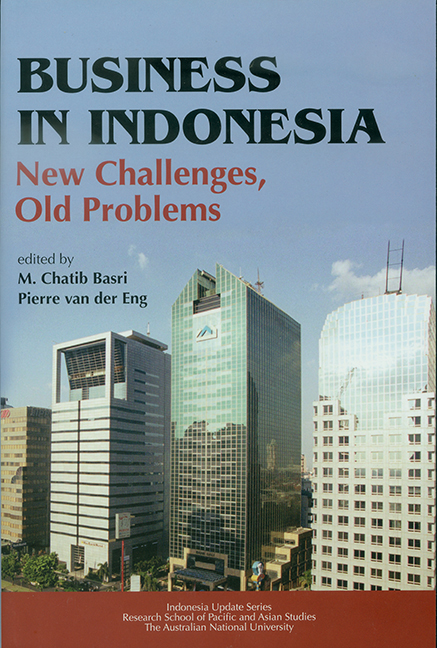Book contents
- Frontmatter
- Contents
- Tables
- Figures
- Contributors
- Acknowledgments
- Glossary
- 1 Business in Indonesia: Old Problems and New Challenges
- PART I Political and Economic Developments
- PART II Overview of the Business Environment
- PART III Foreign Investment and Trade
- PART IV Key Issues in the Business Environment
- References
- Index
- Indonesia Update Series
1 - Business in Indonesia: Old Problems and New Challenges
Published online by Cambridge University Press: 21 October 2015
- Frontmatter
- Contents
- Tables
- Figures
- Contributors
- Acknowledgments
- Glossary
- 1 Business in Indonesia: Old Problems and New Challenges
- PART I Political and Economic Developments
- PART II Overview of the Business Environment
- PART III Foreign Investment and Trade
- PART IV Key Issues in the Business Environment
- References
- Index
- Indonesia Update Series
Summary
Six years ago, Indonesia's business system was in turmoil. Companies were forced to absorb the consequences of a significant depreciation of the rupiah, accelerating inflation, and restricted access to credit due to growing reluctance of foreign lenders and the near-collapse of the domestic financial system. A change in the political regime and the conditions under which the International Monetary Fund (IMF) provided support to Indonesia during 1998–2003 brought an era of political change and reform – reformasi. New government policies were introduced to remedy the problems that had plagued Indonesia's business system in the past.
There have been significant improvements particularly at the macro level during the last six years. The all-encompassing banking crisis was addressed, a run on the banks was avoided and bad loans fell to 8 per cent of outstanding loans. Macroeconomic stability was regained, the rupiah was stabilised and appreciated, inflation moderated, interest rates fell, and export growth was recorded. Even the stock market perked up, reaching pre-crisis levels in January 2004. A new political reality offering a greater degree of openness and plurality emerged. Various policy reforms were introduced and generally sound macroeconomic policies were maintained.
On the other hand, many observers have remained pessimistic, particularly in Indonesia where some ambivalent hankering for the Soeharto era has surfaced. The pessimists argue that reformasi so far has not achieved enough to bolster the bottom line: economic recovery. Indonesia experiences rates of economic growth well below those enjoyed under Soeharto, and below what is needed to generate the jobs and income opportunities that the growing population requires. Dismally low rates of foreign investment compared to other crisis countries, such as South Korea and Thailand, are often regarded as a concise indicator of the woes of Indonesia's business environment.
It is easy to share in the general impression of malaise and argue that the business environment in Indonesia is improving only slowly, if at all, compared, for instance, to the country's neighbours. But such pessimistic observations detract from two facts. First, unlike in neighbouring countries, Indonesia's post-crisis years were marked by drastic change of a multidimensional nature, not only economic change. The political, economic and institutional changes of post-Soeharto reformasi are monumental in historical terms. At the onset of reformasi, it was expected that the changes would soon crystallise and economic growth would resume.
- Type
- Chapter
- Information
- Business in IndonesiaNew Challenges, Old Problems, pp. 1 - 20Publisher: ISEAS–Yusof Ishak InstitutePrint publication year: 2004

